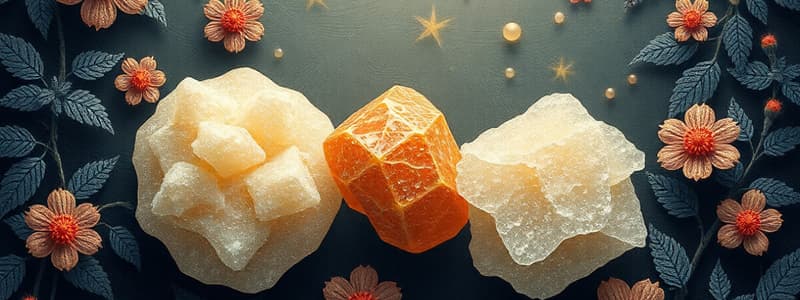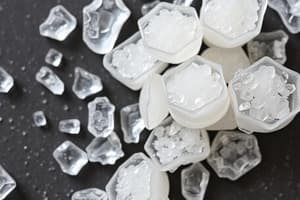Podcast
Questions and Answers
The simple sugar is:
The simple sugar is:
- polysaccharides
- oligosaccharides
- disaccharides
- monosaccharides (correct)
Which of the following consider aldose sugar:
Which of the following consider aldose sugar:
- Glucose (correct)
- Dihydroxyacetone
- Ribulose
- Fructose
One of the following is a ketose sugar:
One of the following is a ketose sugar:
- Glucose
- Ribose
- Mannose
- Fructose (correct)
Aldohexose is:
Aldohexose is:
Levulose is:
Levulose is:
Which of the following is the most abundant biomolecule on the earth?
Which of the following is the most abundant biomolecule on the earth?
Which of the following is the smallest carbohydrate - triose?
Which of the following is the smallest carbohydrate - triose?
Which of the following is an example of Epimers?
Which of the following is an example of Epimers?
Which class of carbohydrates cannot be hydrolyzed further?
Which class of carbohydrates cannot be hydrolyzed further?
The only carbohydrate which does not have any chiral carbon atoms is
The only carbohydrate which does not have any chiral carbon atoms is
The epimer of glucose is
The epimer of glucose is
Glucose is a monosaccharide and is a
Glucose is a monosaccharide and is a
The minimum number of carbons in monosaccharide is
The minimum number of carbons in monosaccharide is
Examples of Epimers
Examples of Epimers
Sugar that makes up RNA is
Sugar that makes up RNA is
Flashcards
Simple sugar
Simple sugar
A monosaccharide is the simplest form of sugar, which cannot be hydrolyzed into smaller sugars.
Aldose sugar example
Aldose sugar example
Glucose is an aldose sugar, meaning it has an aldehyde group.
Ketose sugar example
Ketose sugar example
Fructose is a ketose sugar, containing a ketone group in its structure.
Aldohexose example
Aldohexose example
Signup and view all the flashcards
Levulose
Levulose
Signup and view all the flashcards
Most abundant biomolecule
Most abundant biomolecule
Signup and view all the flashcards
Smallest carbohydrate (triose)
Smallest carbohydrate (triose)
Signup and view all the flashcards
Epimers example
Epimers example
Signup and view all the flashcards
Non-hydrolyzable carbohydrate
Non-hydrolyzable carbohydrate
Signup and view all the flashcards
Carbohydrate with no chiral carbons
Carbohydrate with no chiral carbons
Signup and view all the flashcards
Epimer of Glucose
Epimer of Glucose
Signup and view all the flashcards
Glucose classification
Glucose classification
Signup and view all the flashcards
Minimum monosaccharide carbons
Minimum monosaccharide carbons
Signup and view all the flashcards
Sugar in RNA
Sugar in RNA
Signup and view all the flashcards
Study Notes
Simple Sugars
- Simple sugars are also known as monosaccharides
- Disaccharides, oligosaccharides, and polysaccharides are not simple sugars
Aldose Sugars
- Glucose is an aldose sugar
Ketose Sugars
- Fructose is a ketose sugar
Aldohexose
- Glucose is an aldohexose
Levulose
- Levulose is another name for fructose
Most Abundant Biomolecule
- Carbohydrates are the most abundant biomolecule on Earth
Smallest Carbohydrate (Triose)
- Glyceraldehyde is the smallest carbohydrate (triose)
Epimers
- Glucose and galactose are epimers
- Glucose and fructose are not epimers
- Glucose, ribose, and mannose are not epimers
Carbohydrates that cannot be hydrolyzed further
- Monosaccharides cannot be hydrolyzed further
Chiral Carbon Atoms
- Dihydroxyacetone does not have any chiral carbon atoms
Epimers of Glucose
- Galactose is an epimer of glucose
Glucose Classification
- Glucose is a hexose (6-carbon sugar)
- Glucose is a monosaccharide
Monosaccharide Carbon Number
- The minimum number of carbons in a monosaccharide is 3
RNA Sugar
- Ribose is the sugar that makes up RNA
Studying That Suits You
Use AI to generate personalized quizzes and flashcards to suit your learning preferences.
Related Documents
Description
This quiz covers essential concepts related to simple sugars, including monosaccharides, disaccharides, and their classifications. It also discusses important sugars like glucose and fructose, as well as terms like epimers and chiral carbon atoms. Test your knowledge of carbohydrates, the most abundant biomolecule on Earth!




